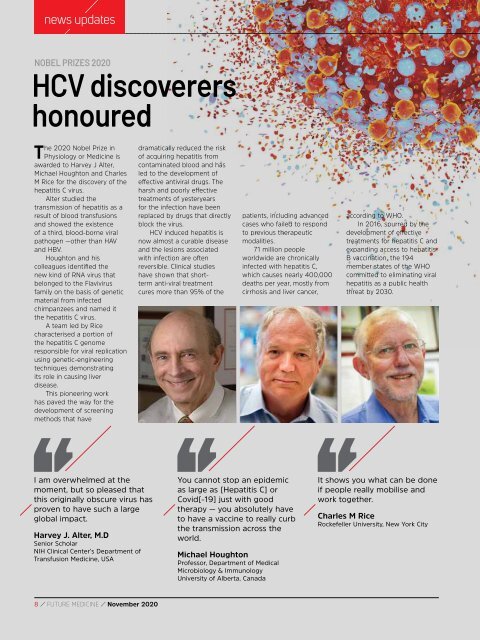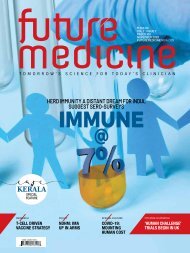Create successful ePaper yourself
Turn your PDF publications into a flip-book with our unique Google optimized e-Paper software.
news updates<br />
NOBEL PRIZES 2020<br />
HCV discoverers<br />
honoured<br />
The 2020 Nobel Prize in<br />
Physiology or Medicine is<br />
awarded to Harvey J Alter,<br />
Michael Houghton and Charles<br />
M Rice for the discovery of the<br />
hepatitis C virus.<br />
Alter studied the<br />
transmission of hepatitis as a<br />
result of blood transfusions<br />
and showed the existence<br />
of a third, blood-borne viral<br />
pathogen —other than HAV<br />
and HBV.<br />
Houghton and his<br />
colleagues identified the<br />
new kind of RNA virus that<br />
belonged to the Flavivirus<br />
family on the basis of genetic<br />
material from infected<br />
chimpanzees and named it<br />
the hepatitis C virus.<br />
A team led by Rice<br />
characterised a portion of<br />
the hepatitis C genome<br />
responsible for viral replication<br />
using genetic-engineering<br />
techniques demonstrating<br />
its role in causing liver<br />
disease.<br />
This pioneering work<br />
has paved the way for the<br />
development of screening<br />
methods that have<br />
dramatically reduced the risk<br />
of acquiring hepatitis from<br />
contaminated blood and has<br />
led to the development of<br />
effective antiviral drugs. The<br />
harsh and poorly effective<br />
treatments of yesteryears<br />
for the infection have been<br />
replaced by drugs that directly<br />
block the virus.<br />
HCV induced hepatitis is<br />
now almost a curable disease<br />
and the lesions associated<br />
with infection are often<br />
reversible. Clinical studies<br />
have shown that shortterm<br />
anti-viral treatment<br />
cures more than 95% of the<br />
patients, including advanced<br />
cases who failed to respond<br />
to previous therapeutic<br />
modalities.<br />
71 million people<br />
worldwide are chronically<br />
infected with hepatitis C,<br />
which causes nearly 400,000<br />
deaths per year, mostly from<br />
cirrhosis and liver cancer,<br />
according to WHO.<br />
In 2016, spurred by the<br />
development of effective<br />
treatments for hepatitis C and<br />
expanding access to hepatitis<br />
B vaccination, the 194<br />
member states of the WHO<br />
committed to eliminating viral<br />
hepatitis as a public health<br />
threat by 2030.<br />
I am overwhelmed at the<br />
moment, but so pleased that<br />
this originally obscure virus has<br />
proven to have such a large<br />
global impact.<br />
Harvey J. Alter, M.D<br />
Senior Scholar<br />
NIH Clinical Center’s Department of<br />
Transfusion Medicine, USA<br />
You cannot stop an epidemic<br />
as large as [Hepatitis C] or<br />
Covid[-19] just with good<br />
therapy — you absolutely have<br />
to have a vaccine to really curb<br />
the transmission across the<br />
world.<br />
Michael Houghton<br />
Professor, Department of Medical<br />
Microbiology & Immunology<br />
University of Alberta, Canada<br />
It shows you what can be done<br />
if people really mobilise and<br />
work together.<br />
Charles M Rice<br />
Rockefeller University, New York City<br />
8 / FUTURE MEDICINE / November 2020

















